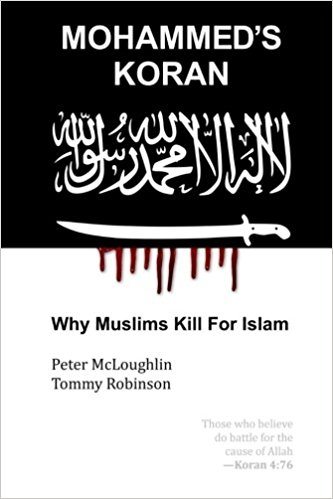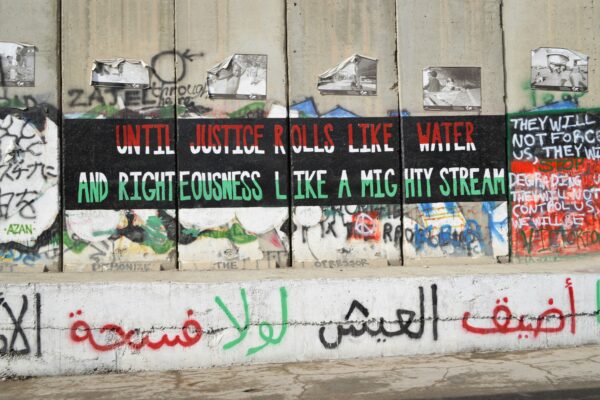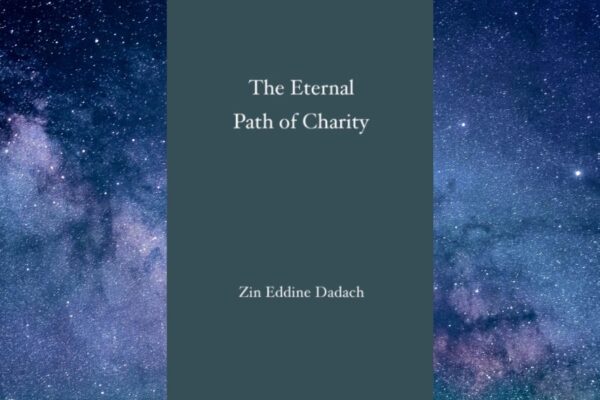“There is some comfort in that this book is not selling in great numbers.”
“There is some comfort in that this book is not selling in great numbers.”
Review written by Julian Bond, the former Director of the Christian Muslim Forum and author of ‘How to read the Qur’an’ and ‘Jumbled up in Jerusalem’ blog series.
‘Mohammed’s Koran’ is written by renowned Islamophobe and former leader of the English Defence League, Tommy Robinson alongside Peter McLoughlin. This isn’t really a book about the Qur’an and it isn’t going to help you understand it. The co-authors have massive chips on their shoulders, as they make clear in their book. They tell us that those in positions of power are lying to us about Islam. They have a huge expectation (or claim to have one) that the leaders of British society should be informing/educating us about Islam. This is the language of the playground and social media, it is very familiar to those of us who are peace activists with an online presence involved in both virtual and real peace campaigning. The authors are not interested in peace. Peace depends on being constructive.
This book is offered as an antidote to the ‘lies’ being told about Islam by giving us fear and death instead. It is not a book which seeks to educate or create understanding, whatever the authors may claim, as is clear from the front cover. It has been designed to create as much fear, hate, distrust and confrontation as possible. I have not wanted to be seen with it while reading it, it looks like a racist, intolerant pamphlet. It is fair to say that there is no chance of misinterpreting the cover or of being in any doubt about what is inside. Unless you particularly wish to find out about conspiracy thinking, how not to read the Qur’an or to have some insight into the extremist outlook of the authors there is actually no need to read it.
The Arabic writing on a black background on the cover is the shahadah (‘testimony’), the Islamic declaration of faith – ‘There is none worthy of worship except God and Muhammad is God’s Messenger.’ It is not a declaration of war or a threat. However, a non-Muslim reader will look at it and see the flag of ISIS. Of course the authors never tell us the meaning of these Arabic words. This imagery is accompanied by a sword below which are drips of blood, another reference to ISIS. It is infantile.
The cover announces that it is about Muslims – ‘Why Muslims Kill for Islam’ – not ISIS, not extremists, not terrorists. It would be possible to engage positively with a book that had the title ‘Why Some Muslims Kill for Islam’ or ‘Why Extremist Muslims Kill for Islam.’ But no, this is about fearing for your safety from all Muslims. It’s fine for anyone to write about the threat of extremism (though it is not the biggest threat to life in Western societies) and terrorism. This is not that book. Instead it is heading towards hostile confrontation, it has, without reservation, chosen the ‘Dark Side’.
Yet, for all that the authors are hostile, even more so are they ridiculous. In its aim to be deadly serious its nonsense is almost humorous. Thus in the Introduction (p.7) we read (in bold, this book has more bold text than any other book in the history of publishing!):
“If you are a Muslim, please put this book down. We do not wish you to become a killer because this book leads you to understand the doctrines and history of Islam more thoroughly.”
It makes me want to give this book to Muslim friends so that they can read it and say, ‘Sorry Tommy, we’re still peaceful and you don’t know what you’re talking about.’ I have done so on a few occasions, one was so appalled that he took a photograph of it. This suggestion is an enormous statement of ego, which blinds the authors to the hard fact that Muslims are overwhelmingly not killers because Islam is not telling them to kill. It takes an extremist, whether ISIS or McLoughlin and Robinson, to tell them that they should be killing. We will not be taking lessons on Islam from you Tommy. It is almost as if he wants a fight. But he is aware that Muslims will not choose to read his book.
The back cover gives more insight into the nature of the book stating that the ‘educated elite … have been actively deceiving the rest of the population [about Islam].’ The authors are not happy because they want to be the ones who are deceiving us about Islam. They do, however, stop short of telling us where their ground-breaking (they describe it as ‘revolutionary’) work will lead once people are able to ‘expose the lies which paralyse the West’s discussions of Islam.’ In fact there has been a lot of discussion about Islam and this book is not adding anything but intolerance and ego to that discussion. It is even doubtful whether the authors understand the processes of education (or choose not to for propaganda purposes) when they mention teachers who ‘indoctrinate your children or force them to attend a mosque.’ Finally they do the work of ISIS for them by telling us that ‘Islam offers two options: submit or die.’ The authors are not to be trusted, they are extremists. Andrew Bostom (who has a similar outlook to McLoughlin and Robinson) describes them as ‘courageous’; they are not courageous, rather they are preachers of fear. As another example of this, they quote Abu Bakr al-Baghdadi – ‘Islam is the religion of fighting’ – we don’t take lessons on Islam from him either, why would we?
The book itself opens by stating that Islam is a religion of war and that this ‘truth’ has been suppressed, which is an incredible statement given the vocal anti-Islam message of the two authors over a number of years. They will have heard numerous others saying the same as them. Soon after we read that it is the ‘elite’ who marginalise what they describe as ‘explicit articulations of Islam’ by describing those who do so as Islamist extremists. The authors share the outlook of others that Islamism is not distinct from Islam. The authors have no problem in telling us what Islam is, even though they stand against Islam. Of course this leads on to ‘your child’ being ‘deceived at school’ (p.8).
The authors want to tell us that Islam is monolithic (is anything?) and have no space to admit that Muslims don’t agree with everything that scholars in the past have written (or that the world has changed a lot since then, it is ISIS who want to take us back to the past). Yes, they can be wrong and may easily depart from the actual meaning of the Qur’an, paralleling what happens in the Christian theological tradition. They then take to task Muslims who denounce atrocities and acts of terrorism as, for them, the views of ancient scholars outweigh contemporary public statements. Who knows why the authors cannot see this? Muslims are standing up against violent interpretations and don’t agree with all that scholars said in the past, even if they translate them. McLoughlin and Robinson could engage with Islam constructively, as they are on the same side, but no. The ‘jihadis’ reward in Paradise is another important building block for the authors. Yet for the vast majority of Muslims who are actually following Islam it is a mark of extremism.
The authors want to take us back in time to the world of war of the Middle Ages with their appeal to the outmoded terms – Dar al-Harb (house, or land, of war) and Dar al-Islam (land of peace). As the world changes and democratic politics spreads terms like this cannot be mapped onto the world in the same way – Europe has been a House of Peace since the end of the second world war, while there is much war in the Middle East (though of course ‘peaceful’ nations have been good at exporting war overseas). And religion is behind neither of these, while politics is.
Contemporary Muslim assessments have described Western countries as more peaceful and more ‘Islamic’ than Muslim-majority nations. Anyone who approaches the Qur’an with the key of war and what they believe to be ‘jihad’ is on the wrong track, and the Qur’an even tells the reader this (a message the authors do not wish to hear, they would rather deal with Islam as the enemy). But, more importantly, for all that the authors (and others) see war at the heart of Islam, it is at the heart of their own outlook. They want to shape our attitudes by bringing war and hate into the conversation (because you don’t spread love by telling people that your neighbour’s religion wants your death) and it is easy to tell lies about Islam in our society. In fact they had a great opportunity to engage with the Qur’an’s message of peace instead and promote that. It’s not easy to trust someone who accuses so many others of lying.
Also read:
However, the ‘genius’ of this book is the authors’ belief that they can solve the problem of people having wrong ideas about Islam by the simple, and unoriginal, technique (beloved of some Christian critics of Islam/the Qur’an) of re-ordering the Qur’an. Have you ever come across a book which worked better when its chapters were re-organised? Actually the Bible comes to mind (and I’m not saying it works), with its re-ordering of the books of the Hebrew Scriptures to create a more helpful sequence. This is exactly how a text can be mis-represented.
Now ask yourself why Muslims never re-organised their scriptures. Even those who compiled the Bible, with a sense of the superiority of the New Testament, didn’t put it before the Old Testament. Robinson and McLoughlin tie themselves in this knot because they think that the Qur’an has been ‘encrypted’ (yes, this is their word), it is a book which apparently needs to be ‘deciphered’ (p.12). Or they could just read it! Of course they take great delight in being wise enough to ‘decipher’ it and have taken on this task because no one else was willing, or perhaps brave, enough (as they might see it) to do so – ‘this is a job which in normal life our society delegates to an elite class’ (p.12). However, the normal life of most British people (in all our diversity) does not recognise society delegating anything to an elite class that we might consider looking up to, we don’t live in the Middle Ages. And of course the Qur’an is in fact addressed to everyone, not the ‘elite’. Make no mistake, this is a distortion of the Qur’an for the impatient and intolerant.
When they say, ‘Commands from Allah [yes, they deliberately want to make God seem alien and foreign] to kill the unbelievers are what dominate the later part of the [Qur’an] … these commands cancel out those few earlier commands which might suggest that Islam is … peaceful.’ (p.13), they are highlighting how they have misused the text. In its usual order the Qur’an is specifically organised to stop people using it as a book of war. Read with understanding, instead of prejudice, the early verses of Surah 2 condemn the activities of Daesh, Al-Qaeda and Boko Haram. Interpreting the Qur’an as a manual for killing is a mark of the extremist, so it is no surprise that the authors interpret it in the same way as Daesh. This is what happens when texts are read too hastily. They describe the Qur’an having ‘commands jumbled up in no particular order’ (p.14), not realising that it is primarily not a book of commands, but a ‘reader’ could not know that without actually reading it.
Those with an agenda of intolerance and violence (considering how much the authors talk about it) can easily promote their message with inaccurate and loose talk about ‘genocide and apartheid’ in surahs 5 and 9 (p.14).
We are no longer in the real world of history and religion but of conspiracy. Personally, I would be embarrassed to write an ignorant book which advertises its ignorance by saying that ‘the book [Qur’an] makes almost no sense’ (p.14). This is a statement more true of ‘Mohammed’s Koran’ than the Qur’an itself. The Qur’an itself invites people to have a go at producing their own version and Robinson and McLoughlin’s attempt is a spectacular failure. In the spirit of engagement with the authors’ message it could easily be said that their book is ‘pervaded with hatred, hostility and violence’ (p.14), rather than the Qur’an.
Many of the statements in this book are laughable (some of them literally so), which may be the real reason the authors do not want Muslims to read it. For example, the suggestion that ‘most Muslims are not directly involved in terrorism’ (p.14) because they have not understood the Qur’an! I wonder if they would agree that some Christians have negative attitudes towards Muslims because they have not fully understood the message of Jesus? Having told a number of Muslim friends that I am writing this review I know what their reaction is when they see comments like this. They don’t know whether to laugh or cry. I encourage you to test this by asking a Muslim friend to read this book, particularly the end of the Introduction’s first paragraph.
But the most flawed idea about the Qur’an in this book is its fixation on what it understands to be ‘abrogation’ – declaring some parts to be cancelled by later revelations. Declaring the Qur’an to be nonsense doesn’t go far enough for the authors, they are committed to treating it nonsensically too. Their efforts at abrogating earlier texts often highlights either their need for a decent proof-reader or some basic comprehension of a text which has already been assembled with a flow and structure. What really gives the lie to their ‘abrogating’ efforts is the verses that they think ought to be cancelled in the last but one surah revealed to Muhammad, including its first verse. It really does not make sense that in this surah, which they use to abrogate many other texts, that seven of its own verses are cancelled (p. 105, 107, 108, 110, 111) particularly as it is an especially coherent chapter, though that realisation escapes them. Of course they would not be able to use abrogation for their purposes if they did not also misread the text. Nor should we trust anyone who offers us an interpretation based on a ‘literal reading’ (p.27). Literal readings are for the most mundane of texts, like telephone directories and dictionaries.
There are many odd things in this book, one of these is the suggestion that ‘we do not want to believe that Islam is intrinsically violent’ (p. 29). Clearly the authors, and a segment of society definitely do want to believe this, otherwise they would be attending dialogue events with Muslims and visiting mosques for constructive purposes. They manage to maintain their thinking, or conclusion as they may hope to convince us, despite the overwhelming contradictory evidence from the vast majority of non-violent Muslims. It makes a lot more sense than the authors’ contention that non-violent Muslims are peaceful because they are not ‘good Muslims’.
Their lazy association of ‘Islamism’ with what they say is authentic violent Islam (yes, there is no place for non-‘Islamist’ Muslims) enables this misrepresentation. This leads into the sadly and disturbingly humorous (this is a book of deep contradictions) suggestion that ‘being a “jihadi” [quotes added] … is precisely the Islamic equivalent of being a monk’ (p. 29, emphasis added and let the absolute nature of that word sink in). The behaviour of so-called ‘jihadis’ shows that they neither follow mainstream Islam nor share the characteristics of a monk. This statement also illustrates again the authors’ unhealthy respect for the ‘elite’.
It’s hard to believe, if you haven’t read it, but this book gets odder with every page, with this bizarre and confusing statement – ‘Praising Islam after every Muslim terrorist attack simply encourages more Muslims to become terrorists and ironically appears to bring Islam fresh converts’ (p. 30). They offer this as an important truth, but of course they do not know if either outcome actually happens, nor could they hope to prove it. And even if they sought to do so they would still need to explain why pronouncements about peaceful Islam encourage Muslims to become violent. They have very little understanding, saying that ‘political leaders who insist on telling us that “Islam is a religion of peace” are seeing the world from the very standpoint of the Muslim terrorists’ (p. 30).
A reasonable and informed reader must conclude that, though the authors castigate today’s leaders for Doublethink, they are engaged in an even more contorted version of it themselves. Terrorists do not see Islam as a religion of peace, they are terrorists not advocates of religion. In fact it’s the authors who have the same understanding of Islam as so called ‘Islamic terrorists’, though they appear not to notice, they do not know the difference between peace and violence. The conspiracist thinking continues with, ‘What the elite are forcing on our societies is Islamisation by stealth and deceit’ (p. 32). Heaven forbid that the authors should be governing us, we would be in the middle of civil war, rather than debating the so-called Islamisation of society.
The authors state that there is ‘no space in the national media to discuss the problems which Islam introduces into our countries’ (p. 33). In fact, Islam has had a great deal of coverage, mostly negative, in the media. The authors, and others, could have been involved in constructive conversations with British Muslims, if they had been interested in doing so, though they never wanted this.
I have commented on the authors’ extremism previously and this is a good example – ‘you [will] see that the final words of Muhammad were that you and your family should be killed’ (p. 35). A reasonable person seeking to understand Islam and Muhammad might instead turn to Muhammad’s last sermon for his actual last words. They go on to say, in the next sentence that the aim of Islam is ‘genocide’. The authors are not responsible (or ‘grown up’, as they might say) people seeking to share with us what Islam is really about. This is in the context of a discussion of Winston Churchill’s assessment of Islam, and it is worth saying that he was wrong too. The authors claim to offer a great insight, ‘the more that Muslims find out about the rules of their religion, the more likely they are to be violent’ (p. 36). This is not an insight either, because it is wrong. The knowledge that we have of those who have joined ISIS is that they have little knowledge of Islam and those who don’t join it, because it does not appeal to them, have more knowledge. Essentially, all that the authors want to say is lazy.
https://www.youtube.com/watch?v=4lH1mV-gVZQ
Of course there is no mention of the oppressive colonial behaviour of Churchill’s era. This is not an even-handed book (as the front cover makes abundantly clear), it only mentions non-Muslims killed due to the Partition of India and Pakistan (p. 36), Muslims were killed too. It is also worth highlighting the limited understanding of the authors as they cannot, or will not, in their writing, see the difference between truth and (contentious) self-identification – a resonant, fraudulent, self-labelling. It is no surprise that they define what a Muslim is – ‘Being a Muslim is a commitment to implementing specific behaviours based on specific doctrines’ – if they mean so-called ‘Islamic’ violence then they are wrong. If they meant the heart of an Islam which is concerned for the other then they would be right.
The authors urge us to ‘grow up and take responsibility for our own understanding of what is inevitable with the introduction of Islam into our culture’ (p. 45). One can guess which segment of the population the authors are referring to but one should definitely, if one is committed to a ‘grown up’ approach, not be following the lead of the authors who are more like school trouble-makers than responsible adults.
Their book is very irresponsible and potentially dangerous, yet one can take comfort that probably few will read it and many of those who do will not be able to take it at all seriously, except as a masterclass in distortion and misdirection. They go as far as to say that once people have read (and fallen for the spurious argument of this book) they will ‘have no difficulty in justifying their hostility to Islam and to those who follow Islam’ (p. 45). This sentence is printed in bold and is showing that the authors are specifically encouraging hostility towards Muslims. I don’t want to emphasise this message but it is integral to exposing everything that is wrong with this book. The authors really do want you to feel hostile towards fellow British people, your Muslim friends, colleagues and neighbours.
The authors take issue with Rodwell’s chronological edition of the Qur’an being replaced in the 1930s by Pickthall’s translation as if this was a conspiracy. I’m sure they realise that publishers decide that a book has had its day. In the case of Pickthall, his translation offered an English version of the Qur’an in its usual order (Rodwell’s was an oddity), there would be good grounds for preferring something more authentic. They acknowledge that in Rodwell’s translation surahs 9 and 5 are at the end, going on from that to make the point that this culmination of violence is clear (to the reader). However, from experience, I would argue that most readers never made it as far as the end of the book. They talk about ‘submitting to Muslim demands’ (p.83) in the area of Qur’an translation but offer precisely zero evidence.
The authors’ writing, an ‘Introduction’ to the re-ordered Qur’an closes in a characteristically confrontational manner, rehearsing their own hateful arguments and insulting any reader who has made it this far and still disagrees with them. I could continue with a critique of their thoroughgoing nonsensical ‘abrogation’ of the Quranic text but that might be another review.
One final observation – at £15 this book is hugely overpriced considering it is essentially a short book attached to a jumbled up reprint of an out of copyright translation of the Qur’an. There is some comfort in that it is not selling in great numbers.
by Julian Bond
Formerly Director of the Christian-Muslim Forum






